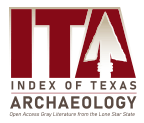Home > Research Projects and Centers > Center for Regional Heritage Research > Index of Texas Archaeology > Vol.
Article Title
Cultural Resources Survey Of The Proposed William Ward Road, Springtown, Parker County, Texas
Agency
Texas Historical Commission
Abstract
In April 2018, an intensive cultural resources survey of the proposed William Ward Road in Springtown, Parker County, Texas was completed in order to inventory all cultural resources prior to construction of the new road. The project corridor is entirely located from the intersection of Knob Road and Summerfield Court at the north end continuing south/southeast approximately 0.66 miles (1.06 kilometers) to Walnut Creek Drive. It is bordered to the north by residential development, to the south by Walnut Creek, with pastureland, hayfields, and oilfields in between. The current archeological project area consists of the entire footprint of the proposed William Ward Road, which is owned by Parker County and covers approximately 8.9 acres (3.6 hectares). The new road will be four lanes, undivided, crossing pastureland, hayfields, oilfields, and residential development.
Because the project area is owned by Parker County, a political subdivision of the State of Texas, the survey is subject to the Antiquities Code of Texas (9 Texas Natural Resources Code 191), which requires consideration of effects on properties designated as—or eligible to be designated as—State Antiquity Landmarks, which includes archeological resources. There is no known federal nexus for this project.
Ground visibility across the project corridor ranged from 0 to 40 percent. The survey revealed the project corridor occurs in disturbed contexts. The area has been used for agriculture over a long period of time resulting in disturbances due to extensive terracing. In addition, disturbances due to oil exploration activities and storage facilities, modern residential development, and associated road construction at each terminus of this project have occurred. No archeological deposits or remains were identified during the survey.
All materials (notes, photographs, administrative documents, and other project data) generated from this work will be housed at the Center for Archeological Studies at San Marcos, where they will be made permanently available to future researchers per 13 Texas Administrative Code 26.16-17.
If any unanticipated cultural materials or deposits are found at any stage of clearing, preparation, or construction, the work should cease and Texas Historical Commission personnel should be notified immediately.
The Texas Historical Commission concurred with the findings and recommendations of this report on April 12, 2018.
Creative Commons License

This work is licensed under a Creative Commons Attribution-NonCommercial 4.0 International License
Included in
American Material Culture Commons, Archaeological Anthropology Commons, Environmental Studies Commons, Other American Studies Commons, Other Arts and Humanities Commons, Other History of Art, Architecture, and Archaeology Commons, United States History Commons
Submission Location
Tell us how this article helped you.


